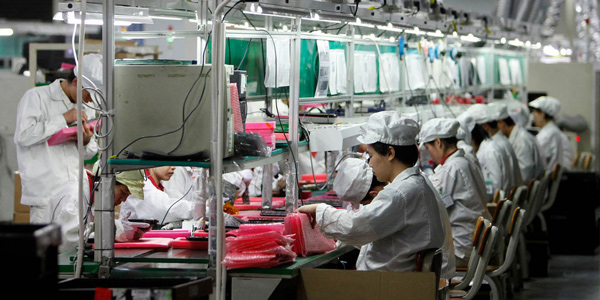By Amanda Durish Cook
A Milwaukee city official is questioning why We Energies ratepayers must pick up the $140 million tab to interconnect electronics manufacturer Foxconn’s proposed plant to the southeastern Wisconsin grid — and the city could attempt to block the plan in the state approval process.
Milwaukee Alderman Robert Bauman and other city legislators are asking why ratepayers should pay for the Taiwan-based company’s interconnection upgrades (137-CE-188) when it is the sole beneficiary. American Transmission Co. (ATC) has proposed constructing a 14-mile 345-kV transmission line, a new 345/138-kV substation and new underground 138-kV lines to connect the substation to a smaller Foxconn-owned substation near the proposed $10 billion manufacturing plant. (See MISO Studying Tx. Upgrade for Massive Foxconn Factory in Wisc.)
“Is it reasonable for ratepayers to pick up a portion of the costs when they’ll see some economic benefit? Sure … [but] this is being built to serve one entity — a privately owned, for-profit foreign corporation. … It’s a basic fairness issue,” Bauman said in an interview with RTO Insider.
Bauman said not many customers are aware that the project will become part of We Energies’ rate base. “It’s very complicated, and it’s inside baseball,” Bauman said.
At a Jan. 4 Milwaukee Common Council hearing, Assistant City Attorney Tom Miller said Bauman’s criticism boils down to a question of: “Is the project proposed for the needs of the public or for a single customer?”
“Bingo,” Bauman replied.
If the project does not satisfy the reasonable needs of the public, Miller continued, the Wisconsin Public Service Commission could withhold project approval.
Alderman Michael Murphy said he has not yet seen a state plan to expand public transit in Milwaukee to grant the city’s unemployed access to some of the 13,000 promised jobs at the Foxconn plant, which will be located about 26 miles south of the city.
Murphy also said he supported Bauman’s arguments and a Milwaukee-led stand against We Energies customers paying for the upgrades.
“Admittedly, I think all of us know the PSC is really a stacked deck, but I still think we should make that legal argument based on the facts,” Murphy said.
Despite what appears to be a majority consensus in opposing the Foxconn project, the council has yet to decide whether to object to the cost allocation. Any objection would be made through a resolution, then passed to the city’s attorney, who could either intervene or lodge an objection to ATC’s request for certificate of public convenience and necessity at the PSC. ATC will file its application sometime in February; a PSC hearing on the project is not expected until June.
Costs for the Foxconn interconnection project will be passed from ATC to We Energies and then embedded in ratepayer bills. Milwaukee-based We Energies is a customer of ATC, which is not beholden to the ratemaking regulation of the PSC but is subject to PSC approval for facility construction.
‘Pennies’
ATC spokesperson Alissa Braatz contends that the typical residential customer across the company’s service area would pay “pennies each year over the projected lifespan of the line,” noting that transmission charges average less than 10% of monthly electric bills. She said the line and substation are meant to “help meet the growing electric demands of current electric users and accommodate the expected growth in businesses and homes in Racine County.”
“In regard to the comments made by Alderman Bauman, any party has the right to file an intervention with the Public Service Commission of Wisconsin, and ATC encourages public input on proposed projects,” Braatz told RTO Insider.
Braatz further pointed out that based on federal tariffs, it’s common for a transmission-only utility like ATC to charge all customers in a service area for transmission projects that “improve the reliability and efficiency of the grid.” By spreading the cost of the Foxconn project among all 5 million customers in ATC’s service area, the “impact is minimal,” she said.
The Streetcar Effect
In his arguments against ratepayers footing the bill for Foxconn’s project, Bauman is drawing parallels to Milwaukee’s new electric streetcar line, approved in 2015.
“In the political context of what’s happened here, I’m absolutely opposed to ratepayers bearing any cost,” Bauman said, referencing a two-year dispute over utility line relocation costs as part of the streetcar project. We Energies first estimated the cost to relocate utility lines at more than $50 million. The amount was later reduced to anywhere from $10 million to $25 million, and a judge in 2016 determined that the city — not We Energies — should fund the relocation. Bauman argues that We Energies essentially got “free infrastructure,” and that because the city must pay for its streetcars’ utility needs, Foxconn must finance its own utility needs associated with its manufacturing plant.
“There were these estimates grossly overstating this relocation,” Bauman said. He sees history repeating itself with ATC’s “pennies” promise. Similar promises were made on the streetcar project, he said.
However, at least one of Milwaukee’s 15 aldermen supports the Foxconn interconnection plan.
“There is absolutely no comparison between Foxconn and our streetcar,” Alderman Mark Borkowski said. “Ten years from now, whoever is still around, can see what the difference is. My money is on Foxconn.”
Alderman Nik Kovac replied that he’d be surprised if Foxconn’s Wisconsin plant was still open in a decade.
MISO Still Considering Expedited Request
Meanwhile, MISO still has yet to render a decision on ATC’s request to grant the Foxconn interconnection project expedited status, which would ensure approval several months ahead of the RTO’s 2018 Transmission Expansion Plan finalization in December.
On Friday, MISO spokesperson Mark Brown said the RTO has not reached any conclusions in studying the proposed project. The RTO will schedule a Technical Studies Task Force meeting in late January and set aside time at its February Planning Advisory Committee meeting to discuss granting the project an accelerated approval process.






